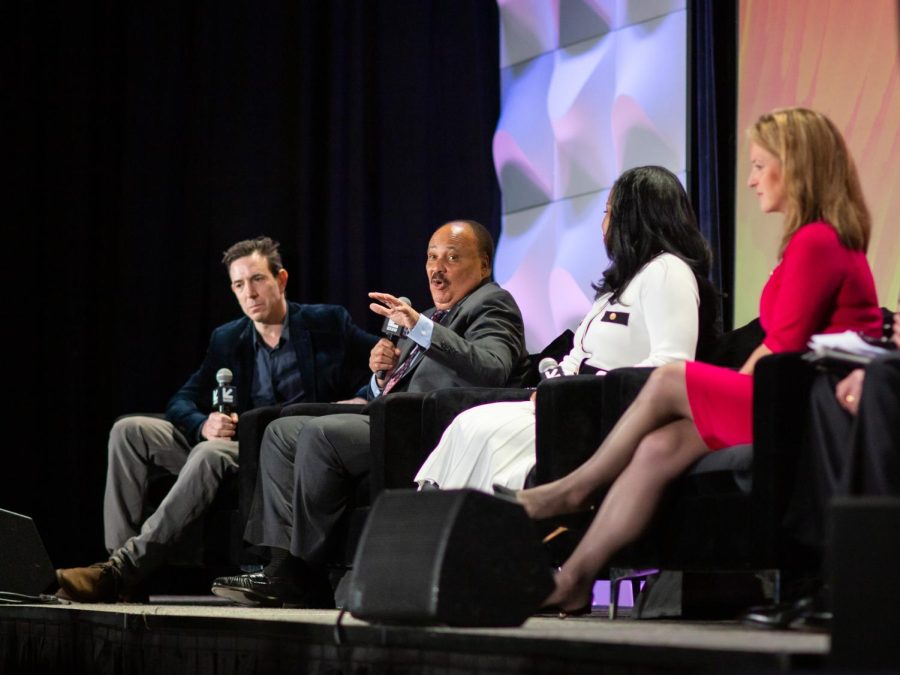Civil rights leaders talk voting rights, accessibility in SXSW session
March 14, 2023
Along with her peers, Arndrea Waters King’s 14-year-old daughter — the only grandchild of Martin Luther King Jr. and Coretta Scott King — sits with fewer rights today than when she was born.
“This is the first generation since Reconstruction that has fewer rights than their parents, grandparents, great-grandparents and great-great-grandparents,” said Waters King, president of the Drum Major Institute. “That’s a slippery slope. … What we believe is that laws lift us all up, (but) what we are seeing is laws that are limiting people.”
The “Voting is a Civil Rights Issue” South by Southwest panel on Monday brought together Waters King, Martin Luther King III, Jocelyn Benson and Ralph Neas to discuss how leaders should make voting more accessible for marginalized communities and how the American people can stay civically engaged.
As of last month, legislators introduced 150 voter suppression bills in 32 states, which Neas said he considers as election subversion, undermining the process of ensuring all votes get counted.
“(These bills) are the most serious internal threat to our democracy,” said Neas, president and CEO of RGN Strategies. “We’ve got to make our top priority saving democracy from this moment on.”
To make voting more convenient for younger voters and historically underrepresented groups, King said officials need to implement mobile voting as an option, where citizens can vote through their phones, laptops and other devices. In June 2022, King wrote an opinion piece for The Washington Post urging states to expand voting access through such legislation.
“Most of us pay our bills online at some point,” King said. “It should be about making it easier for everyone to participate. That would make our country great — when we have unencumbered, unfettered access that is legitimate.”
In 2018, the state of Michigan voted to amend its state constitution and put citizens in charge of forming legislative districts, which helped reduce gerrymandering, said Benson, Michigan’s secretary of state. Benson said the state increased voting accessibility by allowing people to register up to election day instead of a month before, as well as giving them the option to vote from home or by mail. These efforts led to Michigan’s highest ever primary and general voter turnout in the 2020 elections, Benson said.
To further participation in the civic engagement process, Benson said Americans can sign up to be a poll worker, talk to their local representatives about an issue they care about and start discussions online.
“You can’t expect those who’ve gained power through one mechanism to necessarily support policies (that) change how power is granted in our country or states,” Benson said. “It’s historically only been when people stand in demand for democracy that ensures every voice is heard and every vote is counted, that we actually see the changes that open up a more inclusive democracy — which is now more critical than ever as our country becomes increasingly diverse.”
Still, voting remains inaccessible for people with disabilities. For example, Neas said only half of blind voters can vote at the polls without facing accessibility problems. Additionally, a lack of access to resources like printers can discourage voters from using mail-in ballots because most states require a signatory, Neas said.
“Many people with disabilities do not have printers,” Neas said. “The burden it puts on them to get that done and then physically deposit it at a drop box somewhere else takes a lot of time and effort. It is a tremendous disincentive.”
Beyond holding officials accountable, King said people need to be strategic and concrete in addressing their concerns, encouraging the younger generation to organize and take initiative.
“One of the youngest mayors in the country is 18 years old,” King said. “Until young people are engaged in the process, we’re going to continue to miss young people. Young people need to be involved.”
Waters King said one’s right to vote should not be taken for granted, and people should do their part in serving their communities with humanity.
“It’s ironic that the term ‘woke’ is being used in a derogatory manner when the very last sermon that Martin Luther King Jr. delivered, his message to all of us was to stay awake,” Waters King said. “That’s what I urge all of us to do today: Don’t let your voice be taken away.”



